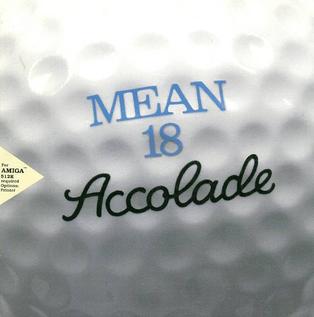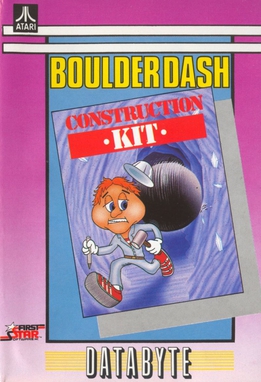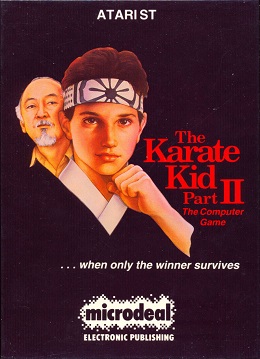
Balance of Power is a strategy video game of geopolitics during the Cold War, created by Chris Crawford and published in 1985 on the Macintosh by Mindscape, followed by ports to a variety of platforms over the next two years.

Silent Service is a submarine simulator video game designed by Sid Meier and published by MicroProse for various 8-bit home computers in 1985 and for 16-bit systems like the Amiga in 1987. A Nintendo Entertainment System version developed by Rare was published in 1989 by Konami in Europe and by Konami's Ultra Games subsidiary in North America. Silent Service II was released in 1990. Tommo purchased the rights to this game and published it online through its Retroism brand in 2015.

Mavis Beacon Teaches Typing is an application software program designed to teach touch typing. Released in late 1987 by The Software Toolworks, the program aimed to enhance users' typing skills through a series of interactive lessons and games.
Chessmaster is a chess-playing video game series, which is owned and developed by Ubisoft. It is the best-selling chess franchise, with more than five million units sold as of 2002. The same cover art image featuring Will Hare was used from Chessmaster 2000 to Chessmaster 9000.

Skyfox is a combat flight simulation game developed by Ray Tobey for the Apple II and published by Electronic Arts in 1984. Ariolasoft published the game in Europe. It was released for the ZX Spectrum, Amstrad CPC, Commodore 64, and Macintosh in 1985, to the Amiga and Atari ST in 1986, and to the PC-88 in 1988.

The Pawn is an interactive fiction game for the Sinclair QL written by Rob Steggles of Magnetic Scrolls and published by Sinclair Research in 1985. In 1986, graphics were added and the game was released for additional home computers by Rainbird.

The Software Toolworks, Inc., was an American software and video game developer based in Novato, California. The company was founded by Walt Bilofsky in 1980 out of his Sherman Oaks garage, which he converted into an office, to develop software for the Heathkit H89 microcomputer. It quickly expanded into video games, releasing Airport and MyChess in 1980; other notable games include Chessmaster 2000, Mavis Beacon Teaches Typing, and Mario Is Missing!. Toolworks merged with its distributor, Software Country, in 1986 and, after going public in 1988, acquired IntelliCreations, DS Technologies, and Mindscape. By 1994, Toolworks employed 600 people and had a revenue of US$150 million. In May that year, it was acquired by Pearson plc for $462 million, which converted it to bear the Mindscape identity by November.

Winter Games is a sports video game developed by Epyx, based on sports featured in the Winter Olympic Games.

Time Bandit is a maze shoot 'em up written for the TRS-80 Model I by Bill Dunlevy and Harry Lafnear and published by MichTron in 1983. It was ported to the TRS-80 Color Computer and Dragon 32, but enjoyed its greatest popularity several years later as an early release for the Atari ST. It was also released for the pseudo-PC-compatible Sanyo MBC-55x with 8-color display. Amiga and MS-DOS versions were ported by Timothy Purves.

Mean 18 is a golf video game designed by Rex Bradford with graphics by George Karalias, both of Microsmiths, and released by Accolade for MS-DOS compatible operating systems in 1986. It was ported to the Amiga, Apple IIGS, Atari ST, and Macintosh. It includes an editor allowing players to create their own courses. In 1989, Atari Corporation published a port for the Atari 7800 console. An Atari 8-bit family version was in development in 1989 but was ultimately cancelled.

Arcticfox is a science fiction tank simulation video game developed by Dynamix and published by Electronic Arts in 1986. It was published in Europe by Ariolasoft. A sequel to Dynamix's Stellar 7, Arcticfox was developed for the Amiga as one of the platform's first titles but was quickly ported to other platforms including the Atari ST, Commodore 64, ZX Spectrum, MS-DOS and Apple II. A third game was released in the series in 1991 titled Nova 9: The Return of Gir Draxon.

Colossus Chess is a series of chess-playing computer programs developed by Martin Bryant, commercially released for various home computers in the 1980s.

Shanghai is a computerized version of mahjong solitaire published by Activision in 1986 for the Amiga, Atari ST, Atari 8-bit family, Commodore 64, DOS, Macintosh, Apple IIGS and Master System. Shanghai was originally programmed by Brodie Lockard. It was released as an arcade game by Sunsoft in 1988.

Temple of Apshai Trilogy is a remake of three games from the Dunjonquest series, Temple of Apshai, Upper Reaches of Apshai, and Curse of Ra.

Leader Board is a series of golf simulation video games that was developed by Bruce Carver and Roger Carver, and published by Access Software.

Boulder Dash Construction Kit is the fourth game in the Boulder Dash series. It published for the Commodore 64 and Atari 8-bit family in 1986 by Epyx. Ports were released for the Apple II, Atari ST, Amiga, Amstrad CPC, ZX Spectrum, and MS-DOS. The Spectrum version was rereleased as Boulder Dash IV: The Game. Boulder Dash Construction Kit includes new levels and a level editor.

Ogre is a 1986 computer game based on the Ogre board wargame. It was released by Origin Systems for the Apple II, Amiga, Atari 8-bit family, Atari ST, Commodore 64, MS-DOS, and Macintosh.

The Karate Kid Part II: The Computer Game is a fighting game based on the 1986 film The Karate Kid Part II. It was initially released for the Atari ST in 1986, and an Amiga port was published in 1987. It was published by Microdeal in Europe and the United States, and by Ozisoft in Australia.

Golden Oldies: Volume 1 - Computer Software Classics is a retrospective compilation of four games from prior to the microcomputer era: Adventure, Eliza, Life, and Pong. It was published in 1985 for the Apple II, Atari 8-bit family, Commodore 64, and DOS. Atari ST and Amiga versions followed in 1986. Despite the "Volume 1" in the title, no further collections were released.

The Fidelity Chessmaster 2100 is a 1988 video game published by The Software Toolworks. An Atari ST version was advertised but never released. A Sega Mega Drive version was also planned and shown at Winter CES 1992 but was never released.


















